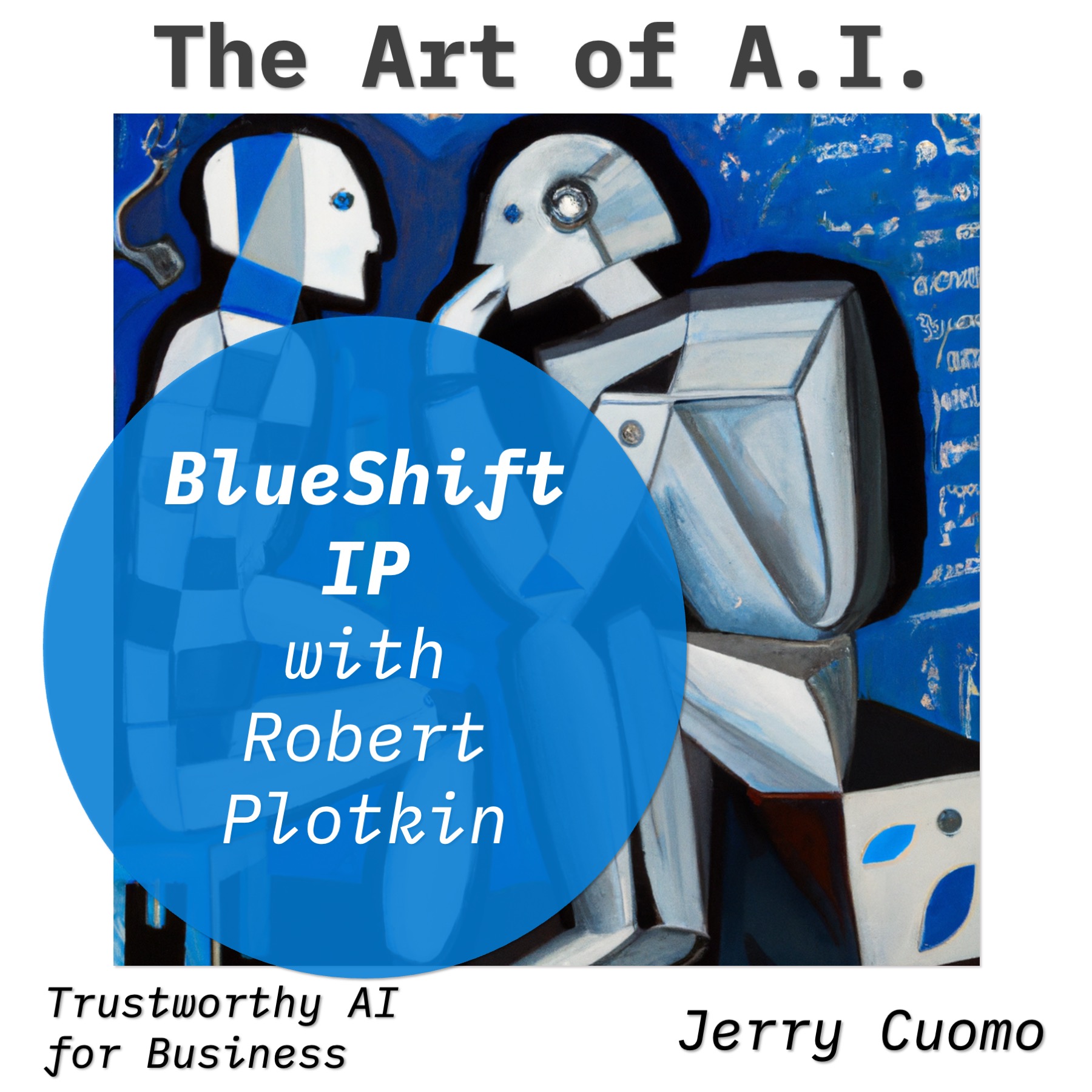IP Law and AI
- 0.5
- 1
- 1.25
- 1.5
- 1.75
- 2
DJ: You're listening to the Art of AI podcast with your host, Jerry Cuomo.
Jerry Cuomo: Thank you, DJ. Folks. Today's topic is a personal favorite of mine, and that's intellectual property. You see, raised in a family with a material scientist, I've been immersed in IP since I was 12. From then to now, I've understood that securing IP for your company empowers it with freedom of action and demonstrates value to its users in our dynamic world, and it's a fundamental practice in big tech today. And there's been much press about AI and intellectual property of late, and frankly, much of it has not been good, with copyright violations that during the training process, likely being the biggest headline maker. So I'm hoping today's episode will balance out the discussion. And for that discussion, we have a world- class MIT trained technologist with us, and he's also an AI book author and software patent attorney joining us to put things in perspective. His name is Robert Plotkin and he is the co- founder of Blueshift IP. And his positive view and personality will leave you smiling and encouraged about the future of all things AI. So with that, I'd like to welcome Robert to the podcast. Welcome, Robert.
Robert Plotkin: Hi, Jerry. Thanks so much for having me.
Jerry Cuomo: Perfect. Hey, lot to talk about. Let's jump into the first question, if you don't mind. The first question, Robert, is our listeners would love to know why you love doing what you do.
Robert Plotkin: Well, I'm a patent attorney specializing in obtaining patent protection for cutting- edge software, AI and otherwise. And one thing I love is that I get to work with amazing, brilliant, innovative people all the time-
Jerry Cuomo: Wonderful.
Robert Plotkin: ...who are developing cutting- edge technology. So I've always loved that my whole life, and this gives me the ability to be right in the mix with them.
Jerry Cuomo: Oh, perfect. And this subject is right up my personal alley, Robert. I grew up in a household where IP and patents were a thing at 12- year- old sitting at the dining room table talking to my dad. Oh, perfect. Tell us a little bit about your background.
Robert Plotkin: Yeah, I started programming computers as a kid back in the early'80s. You probably know TRS- 80 was the first computer I programmed in Basic.
Jerry Cuomo: Oh, sure. Sure, sure. Basic is underrated, Robert.
Robert Plotkin: So that was where I got started, and I've just been passionate about computers and software development ever since. Went on to study computer science at MIT, then went straight to law school and been a practicing patent attorney ever since for over 25 years in private practice, working with innovative companies who... often start- ups, growing companies, some really large companies as well to develop patent portfolios that protect their inventions.
Jerry Cuomo: And what led you to jump the tracks from computer science to IP?
Robert Plotkin: I always had a mix of interests and skills, I think. I loved writing. I loved arguing. I loved strategizing. And so law and patent law in particular gave me the ability to marry all of those skills and interests and abilities together. And in fact, I had found that by the time I was getting close to graduating from my undergrad degree, I wasn't as interested in doing the detailed coding work. And so yeah, this just gave me the ability to put it all together.
Jerry Cuomo: Yeah. And it wasn't until just then that I realized that so many of my colleagues would probably make good IP attorneys because they love to argue, and they love to debate. This is an inert skill for a computer science person. So I can now visualize how you did that. Wonderful. So tell us a little bit about what's trending in IP, and I'm setting up here. I know there's a big intersection these days with the Netscape moment of OpenAI. AI's been out for a very long time as you and I both experienced in school, but it's recently become accessible to many. And there's beautiful things, and there's concern. So can you share a little bit more about your customers and what they're up to? What's trending?
Robert Plotkin: Yeah. In fact, there's several different ways in which AI is intersecting with IP law. I think the one that pops into most people's minds immediately is, can AI- generated works be protected by IP? AI- generated artwork, videos or inventions. Can those be protected by patent law? That's the first. Can AI- generated works be protected by IP? The second is, and is that new developments in AI technology itself can be protected by IP. I obtained patents on new methods of training models, for example. New types of models can be protected by IP. The third impacts me and lawyers, is that AI is being used in the practice of IP law in some really fascinating and productive ways. And then the fourth, this is a little more philosophical, but it's the one that gets a lot of people's attention, is that because AI has some human- like qualities, it raises questions about whether AI could ever be an inventor or own intellectual properties.
Jerry Cuomo: Wow.
Robert Plotkin: So several different ways in which AI is intersecting with intellectual property.
Jerry Cuomo: Robert, can we just touch very quickly on each of those brilliant and top of mind? So can you give us a little sample example for each of those just running right across?
Robert Plotkin: Yeah. So a sample is the short answer to, can AI- generated... I like to say AI- assisted inventions be patented. Answer is absolutely yes. People have used tools of all kinds to help them invent for as long as people have been inventing. AI is more powerful, but it's the next generation of tool that people have used to help them invent, goes beyond a test tube. Or think about conceptual tools like mathematics, calculus, physics. All of those are tools people have used. And the fact that people use those tools doesn't mean that they can't get patent protection. So yes, people can get patent protection and copyright protection for works created with assistance of AI. And then new developments in AI technology. Again, I mentioned methods of training a model. If you come up with a method of training that's more efficient or method of executing a model that's more efficient, absolutely you can obtain IP protection for those. AI being used in the practice of law. Absolutely being used in analysis and drafting of contracts. But more recently in my own field, we are starting to use some tools that are assisting in the drafting of patent applications and also in doing things like prior art searching and analysis of patents, patent portfolios.
Jerry Cuomo: And Robert, that is a big deal because folks like me in computer science and the like, we have to choose how we spend the hours in our day. And often the task of writing and capturing your IP takes time. And if you have a time slot for that, great, but often we don't. So it doesn't get captured. But with GenAI specifically in large language models, it is now lowered the barrier to entry to capture IP, whether that's the writing part or the searching part, et cetera, et cetera. So now I actually have the time to do it. So again, we can focus now not only on creating IP, but creating more pointed and more purposed IP along the way.
Robert Plotkin: Yeah. And I find what you just gave us a great example, which is if you are the inventor, even if you're not going to write the patent, it can help you create a written description or an invention disclosure to provide to someone like me more efficiently in less time that it would've taken. And then on my end, I can take that and use GenAI to help me understand what you've given me and create the finished work product more efficiently. And also to go back and forth. It's just helping all around. It does have to be used intelligently and judiciously.
Jerry Cuomo: Yes. Responsibly.
Robert Plotkin: That kind of stuff.
Jerry Cuomo: Yeah, I agree. And it's so wonderful for what I call writer's block. And it's not that I expect it to do my writing, but sometimes it just gives you a nudge in one direction or another. And I think with that, you're off to the races, which is awesome.
Robert Plotkin: Absolutely. I find it's great, as you said, of keeping me from getting stuck. If I'm writing, particularly for something like, oh, I'm writing and I want an example of a concept, I'll ask it, " Here's the concept. Give me a few examples." And then often I'll say, " Oh yeah, I knew that one example, but it wasn't at the top of my mind."
Jerry Cuomo: That's right. So now, Robert, can you go to the first one, which I has made the news many times over the last few months, which is copyright infringement and being able to trust the output from an AI model. Tell us a little bit about your views there.
Robert Plotkin: Yeah, I mean, what's interesting is large language models, other types of AI that people are generally lumping under generative ai. It's not a search engine, it's not a database. It's not something that literally looks up data that's there. And as a result, what you get out, you can't necessarily rely on it as being an accurate reflection of what went in. If you look to it for that purpose, you're going to be disappointed. What are being called hallucinations will then be either frustrating to you or misleading to you. And if you use those irresponsibly, you're actually going to be in trouble. But once you recognize that it is a statistical engine, it's something that gives you output that's in the vicinity of truth, but may not be the literal truth down to every detail, you can make some really productive uses of it.
Jerry Cuomo: Yeah. And Robert, I mean at some level, this is brand new novel, but on another level, we've been there before. Trusting information that we get from Google, that you read on social media, as a developer that you get on Stack Overflow, everyone should be using. Don't forget, you're a person, you're a human. Use your ingenuity. Use your reason and judgment. AI should not be any different. It shouldn't be taking it as gospel, but it's something that, okay, what do you want to do with this? Now it's up to you. You own it.
Robert Plotkin: Yeah. There is something about the form I think in which tools like ChatGPT present their output that can lead people to give it more credibility than it's worth. You might call it something like apparent confidence. You ask it a question, and then it gives you this answer without saying, " I'm not sure," or anything like that. And it can give you highly accurate output or highly inaccurate output without any distinguishing cues to let you know, distinguish one from the other. So that just puts more of the burden on us as the user to be responsible. And I would say maybe trust, but verify.
Jerry Cuomo: Perfect. I agree. I agree. As we go into the day- to- day usage, I mean part of what we're doing these days in my company is thinking about every role across all dimensions from finance to software engineering, code generation, HR, et cetera, et cetera, and figuring out how this could assist us in our day- to- day activity. So when you look across enterprise, where do you see the most opportunity from an innovation perspective to apply AI?
Robert Plotkin: Yeah. I mean, one is to take existing knowledge and processes within a business and identify those, and then enable people to carry those out reliably. I mean, this is the kind of thing that used to be done through written procedure manuals and training and all of that. And now AI has the ability to digest both explicit information about how a company does its business and infer that in information by observing people in their work, and then either perform some of those tasks automatically or help people along in performing those tests. So to me, that's kind of low- hanging fruit. It's not very sexy. It doesn't hit the headlines a lot, but this sort of helping people to perform routine processes more efficiently, I think has a lot of potential return on investment.
Jerry Cuomo: Perfect. So let's hone in again on your routine processes. Now, I've befriended our IP group in IBM a long time ago. They actually seem busier than ever right now thanks to our friend, AI. Whilst many other people are talking about jobs going away. And I'm not doubting that that might happen, but what I see is, especially in IP and law, things seem to be booming. Am I getting that right? Can you put a little color behind that?
Robert Plotkin: Yeah, absolutely. In my own field, because there is so much innovation going on in AI, and what we do at my firm is obtain patent and other IP protection on innovative software and AI technology, things are booming for us. But you have to remember also, people tend to look at something like AI or any sort of automation as just eliminating tasks that humans can do. You have to remember, there's the flip side, which is it creates new tasks.
Jerry Cuomo: That's right. That's right.
Robert Plotkin: It creates opportunities to solve new problems. It can actually expand the range of problems that we tackle.
Jerry Cuomo: Exactly.
Robert Plotkin: So it acts on both sides. I think people have a fear or scarcity mindset about this stuff, when you have to see the other side of it as well.
Jerry Cuomo: Okay. I know you have a crystal ball. So if you don't mind, can you wield its power right now and look into it and share with our audience what you see?
Robert Plotkin: There's so many different directions that I could take that in, but there's one thing that, which is the trend we've seen all along with AI and just technology generally since the beginning of the industrial revolution. Which is that it has enabled the automation of increasingly higher level tasks. And you can either see that from the threat point of view, that it's eliminating work that humans can do. Or you can see it as a form of liberation, which is that it frees us from the drudgery of these low level tasks and enables us to engage in higher level planning, ideation, creativity, higher level problem solving. That's what excites me really about AI.
Jerry Cuomo: That's right.
Robert Plotkin: So it creates that opportunity. I wrote this book, The Genie and the Machine in 2009, about AI augmented inventing, and I had a great opportunity to research a lot of history, including that astronomers back in the Middle Ages. Their days were spent computing logarithms manually.
Jerry Cuomo: Right, right, right.
Robert Plotkin: Right? And then the creation of written logarithm tables on parchment freed them to engage in higher level mathematics.
Jerry Cuomo: That's perfect. Yeah.
Robert Plotkin: I mean, we've seen that go on every single generation of technology, on and on and on. We're seeing the next stage of that now with generative AI, and that really excites... it's a liberating potential.
Jerry Cuomo: Yeah, I agree. Both elevating the value, focusing more on higher value work, but also just getting back that gift of time, whether it's to dedicate it to these things or just spend more time with people you love. So awesome. Well, thank you so much, Robert, for joining us. This was an amazing conversation. I can talk to you all day. Thank you.
Robert Plotkin: Thanks so much for having me, Jerry. I really enjoyed it.
Jerry Cuomo: Okay. This episode's a wrap. In the description section of this podcast, I've included some reference material on BlueShift IP and other material that you'll certainly want to check out. And once again, I'd like to thank Robert, and I'd also like to thank you all for listening in. Until our next episode, this is Jerry Cuomo, IBM Fellow and VP of Technology. I'll see you soon.
DESCRIPTION
Listen in as host Jerry Cuomo sits down with Robert Plotkin, a renowned patent attorney, AI book author, and co-founder of Blueshift IP. With a rich background that bridges technology and law, Robert shares insights into the crucial role of intellectual property in the era of AI. The discussion spans the impact of AI on innovation, patent law, and the future of AI-generated works. As someone deeply familiar with the intersection of technology and intellectual property, Robert's expertise offers listeners an encouraging perspective on navigating the complexities of AI and patents. This conversation not only sheds light on the importance of securing IP for technological advancements but also explores the potential of AI to revolutionize the practice of law itself. Join us for a thoughtful exploration of how AI continues to shape the landscape of intellectual property and innovation.
Key Takeaways:
- Intellectual property secures companies' freedom of action and demonstrates value, crucial in the dynamic tech landscape influenced by AI.
- AI-generated works can indeed be protected by IP law, expanding the scope for innovation and creative expression.
- The use of AI in law, especially in patent drafting and prior art searching, enhances efficiency and productivity in legal practices.
References:
The Genie in the Machine by Robert Plotkin
* Coverart was created with the assistance of DALL·E 2 by OpenAI. ** Music for the podcast created by Mind The Gap Band - Cox, Cuomo, Haberkorn, Martin, Mosakowski, and Rodriguez
Today's Host

Jerry Cuomo
Today's Guests








